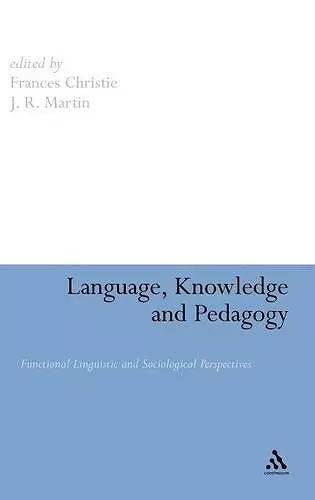Language, Knowledge and Pedagogy
Functional Linguistic and Sociological Perspectives
Frances Christie author Frances Christie editor Dr J R Martin editor
Format:Hardback
Publisher:Bloomsbury Publishing PLC
Published:1st Feb '07
Currently unavailable, and unfortunately no date known when it will be back

An in-depth exploration of the nature of language, knowledge and pedagogy, providing a progressive analysis of knowledge structures at work in educations institutions.
Explores the nature of knowledge, language and pedagogy from the perspective of two complementary theories: systemic functional linguistics, and Bernstein-inspired sociology. This book shows the impact of language on knowledge and pedagogy. It examines the different structures of knowledge and the flow of information within the school context.This book explores the nature of knowledge, language and pedagogy from the perspective of two complementary theories: systemic functional linguistics, and Bernstein-inspired sociology. Bernstein's sociology of knowledge makes a distinction between horizontal and vertical discourses as ways in which knowledge is transmitted in institutional settings, with teachers as agents of symbolic control. Systemic functional linguists have explored educational discourse according to similar hierarchies, and by bringing the two perspectives together this book shows the impact of language on knowledge and pedagogy. The contributors examine the different structures of knowledge and the flow of information within the school context, but also according to language in early childhood, literacy, English, the social sciences, science and mathematics. The result is a progressive and dynamic analysis of knowledge structures at work in educational institutions.
"This volume is worthy of attention because its contributors are leading scholars in the traditions of SFL and Bernstein's sociology, developing the ideas and applications further, expanding their descriptive and explanatory potential. The resulting "assuredness" with which the book reads, and the dialogic structuring of the chapters (there is a strong sense of progression throughout), assist the reader with its quite complex ideas and arguments. So too does its emphasis on application of theory to the empirical issues. "The book makes a valuable contribution to the fields of education and applied linguistics. It undoes the oppositional tendencies of terms such as "everyday" and "commonsense", and offers instead more useful ways of thinking about different bodies of knowledge and the forms of discourse favoured by them. The applications to disciplinary knowledge make its international address clear. In the Australian educational context, this is a particularly timely volume for two reasons. It is critical preparatory reading for the reappraisal of official curriculum that must come with the move to national curriculum and national testing regimes. It also provides salutary warning of the problems of integrating curriculum currently evident in pedagogic trends such as "rich tasks" and "connected outcomes groups". "This book is a valuable resource for teacher educators, curriculum developers and policy makers concerned with rigorously informed curriculum and pedagogy. Researchers of language and education too will continue to reap benefits from what Jim Martin describes as "the negotiation of ideas initiated by Bernstein, Halliday and Hasan into a second generation of research" (p. 239)." - Australian Review of Applied Linguistics -- Pauline Jones, University of Wollongong, Australia
ISBN: 9780826489173
Dimensions: unknown
Weight: 570g
282 pages